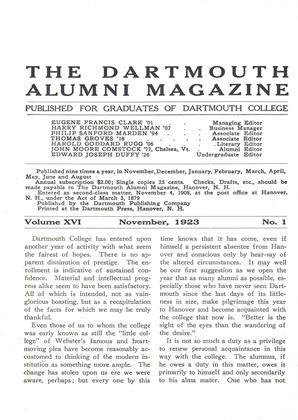The Monadnock Breeze for August 10, 1923, publishes the following interesting account of an early Dartmouth graduate:
August 8, 1856.
The Rev. Laban Ainsworth, senior pastor of the Congregational church of Jaffrey, is now in his one hundred and third year, dating his nativity July 16, 1754, at Woodstock, Conn. He was ordained and settled in the ministry at Jaffrey in 1784, and consequently has been pastor of the same church 72 years. He entered Dartmouth College in 1774 and he is the oldest living graduate of that college. His father designed him for Harvard University, but on account of the Revolutionary troubles at Cambridge he sent him to Dartmouth which had just before (1770) been started by Dr. Wheelock. His father gave him a horse to carry him to his destination through the wilderness of western New Hampshire, to furnish him with means of flight if pursued by the regulars and to furnish him with funds from the sale of the beast to pay his bills. The memory of that journey and the horse is very fresh in the mind of Mr. Ainsworth. Of the horse he relates that he once lent him to John Wheelock, afterwards second president of the college. When returned, he told the servant the horse looked as if Pluto had ridden him. The servant asked Ainsworth who Pluto was. He replied, the devil. The report went to the president that Ainsworth had used profane language, and he was called to account for it, but without serious issues.
Mr. Ainsworth likes to relate this passage with Professor Smith. The professor having been out a mile or so east of the college, mistook a large stump and two smaller ones near, all charred, for bears. He hastened home in trepidation, exclaiming, "A bear and two cubs!" Some time after this, the professor at an examination of the class called up Ainsworth with the proposition — "You may illustrate the passion of fear." Mischievously he asked, "shall I illustrate by .word or action?" "By either, or both," was the reply. Then gathering the folds of his gown with a sudden movement in imitation of a well known habit of the professor, he cried out, "A bear and two cubs!" "A bear and two cubs!" Dr. Wheelock, who was present, laughed excessively as did the class. The professor thought the offence worthy of discipline, but not being able to accomplish it he laid it up as a permanent grudge.
Mr. Ainsworth describes with vivacity the state of things at that day around the college, the howling of wolves by night, the apprehensions of attacks from Indians, the rude appearance of the grounds, etc. The removal of the pine stumps from the Common was a work of time and formidable. The students were pressed into this service in the working season by a lottery in which each must take a share in the removal of one stump. Many were the evasions practised, so as to remove the stump, but not fill up the hole, "It being not so stated in the bond." "And that," says Mr. Ainsworth, "is the reason why the Common is so full of holes."
Mr. Ainsworth is a little below medium height, slightly built, an aquiline nose, an earnest look, hair gone except on the back of his head where it is profuse and arranged in a queue. Within a few months his decline has been rapid.
 View Full Issue
View Full Issue
More From This Issue
-
 Article
ArticleTHE GOAL OF EDUCATION
November 1923 By ERNEST MARTIN HOPKINS -
 Article
ArticleDartmouth College has entered upon
November 1923 -
 Article
ArticleAFTER TEN YEARS
November 1923 By FRANK LATIMER JANEWAY -
 Class Notes
Class NotesCLASS OF 1910
November 1923 By Whitney H. Eastman -
 Class Notes
Class NotesCLASS OF 1903
November 1923 By Perley E. Whelden -
 Class Notes
Class NotesCLASS OF 1917
November 1923 By Ralph Sanborn
Article
-
 Article
ArticleReplying to the Critics
MARCH, 1928 -
 Article
ArticleKey to Abbreviations of Branches of Service
December 1942 -
 Article
ArticleBicentennial Events
OCTOBER 1969 -
 Article
ArticleFACULTY NEWS
DECEMBER 1997 -
 Article
ArticleDartmouth 38, Columbia 14
December 1952 By Cliff Jordan '45 -
 Article
ArticleBig Green Teams
DECEMBER 1972 By Jack DeGange


